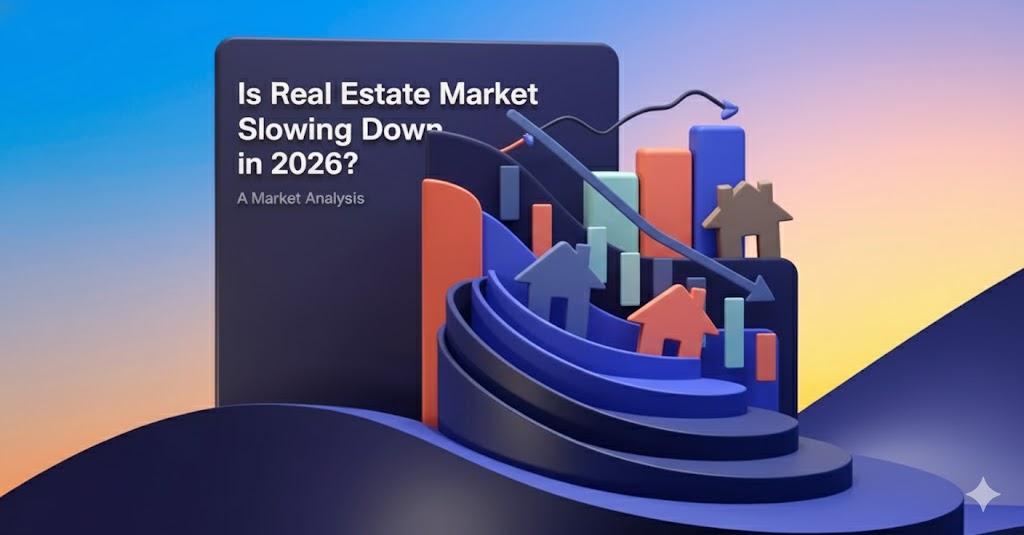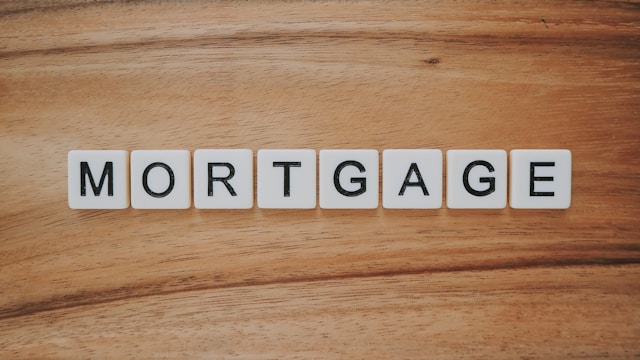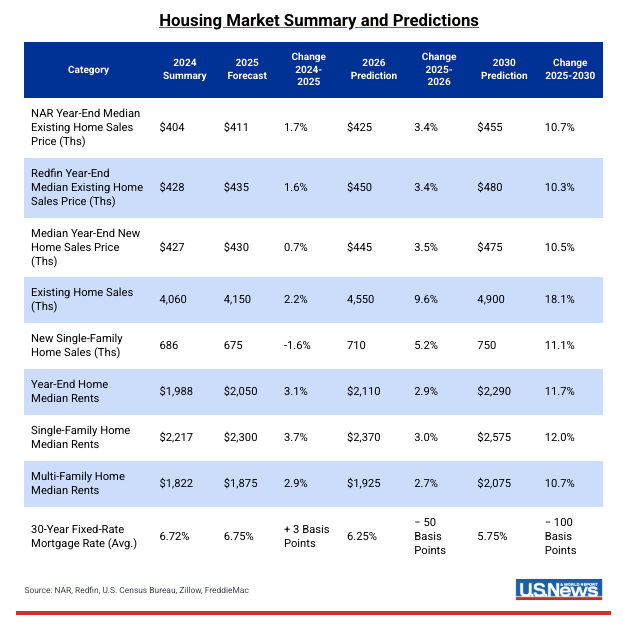Is Real Estate Market Slowing Down in 2026?
Published on
November 20, 2025

Interested in growing wealth through investing in rental homes? Join the Priority Access List today.
Is the real estate market slowing down in 2026? It’s a question that’s been circulating among homeowners, investors, and industry professionals alike, especially after years of dramatic ups and downs. While the market’s pace has shifted from the frenetic surge of the early 2020s, the story for 2026 isn’t about a crash or collapse. Instead, it’s about balance: a slow, steady recalibration that many experts say could mark the return of a more sustainable housing environment.
Key Takeaways
- The real estate market in 2026 is not expected to experience a slowdown or crash; rather, experts describe this year as a return to balance after several volatile cycles.
- Home prices are expected to rise moderately, marking steady, sustainable growth rather than rapid spikes.
- Mortgage rates are easing and inventory is improving, though still below historical norms, leading to fewer bidding wars and more negotiating power for buyers.
In this article, we’ll take a closer look at what experts are saying, what the data reveals, and what buyers, home sellers, and investors can realistically expect as we move closer into 2026.
What Does a “Slowing Market” Actually Mean?
When experts say the real estate market is “slowing,” it doesn’t necessarily mean home prices are falling or that a crash is coming. Instead, it refers to a deceleration in activity. Say fewer bidding wars, longer listing times, and more balanced negotiations between buyers and sellers. Homes may still appreciate, but at a more measured pace compared to the explosive growth seen during the pandemic-era boom.
A slowing market often signals that supply and demand are gradually aligning. Inventory levels start to rise, giving buyers more choices, while sellers may need to adjust pricing expectations. Mortgage rates, inflation, and employment trends all play a role in how “slow” or “active” the market feels. In essence, it’s about normalization after years of volatility.

Hot vs. Cold Market
Housing market trends have always changed. They've been hot and cold depending on what's happening in the economy and financial markets.
A hot market is what we saw late in 2021 into 2022. Housing prices skyrocketed beyond their property values, and buyers still went through with the sales. You can think of a hot market as a seller's market because there are more buyers than sellers, so there's a lot of competition for the same homes.
A cold market means there are more sellers than buyers. In a cold market, there is a drop in prospective buyers, leaving sellers without many bids on their homes. Buyers have the upper hand in a cold market because sellers won't have as many people knocking on their doors. When home sales are down, buyers often pay lower prices for a home.
Factors That Affect Real Estate Prices
With the volatility of housing prices, it's essential to understand what factors affect the real estate market and its prices.
Interest Rates
Mortgage rates were just about as volatile as housing market prices. When mortgage rates are low, housing affordability rises. In other words, the less interest you pay, the more money you can afford to borrow. This increases house prices. But, if interest rates rise, housing affordability decreases, which causes real estate prices to fall.

Government Housing Policy
Occasionally, the government steps in to increase or decrease home sales. For example, in 2009, Congress created a first-time homebuyer's credit to make home-buying more accessible and enticing for first-time buyers. The tax credit increased demand temporarily, but it wasn't a long-term increase since it was a short-term credit.
Demographics
Demographics play a significant role in today's market. It controls what properties experience the highest demand, which are no longer sought after, and can set real estate trends for decades. For example, baby boomers are the most prominent demographic real estate experts are watching. Since most are retired or are nearing retirement, the residential market trends may change for many years.
Economy
The state of the economy has a significant effect on the housing market trends. When the economy does poorly, the housing market slows down. But when unemployment rates are down, and the outlook is good, there are usually more home shoppers, which can drive prices up.
2026 Housing Market Outlook and Trends
After several unpredictable years, experts across the industry agree on one big theme for 2026: stability. The chaos of bidding wars, surging interest rates, and pandemic-fueled price spikes is finally giving way to a calmer, more sustainable housing environment.
1. Stability and Moderate Price Growth
Nationally, home prices are projected to rise by around 3–4%, according to housing analysts, a pace that signals balance rather than boom. This moderate growth marks a sharp contrast from the double-digit spikes of 2021 and 2022.
Experts emphasize that such steadiness is actually healthy for the market, as it allows wages, construction, and lending to catch up. As noted in the 2026 Housing Market Outlook, the year is shaping up to be one defined by measured progress, not dramatic swings.
2. Easing Mortgage Rates
The #1 thing nearly every buyer has been waiting for (lower mortgage rates) is finally starting to materialize. After peaking near 7% earlier this year, rates have begun to ease.
Experts predict a gradual decline throughout 2026, potentially reaching the low 6s or even high 5s by year’s end. Of course, there will be some short-term volatility as new economic data rolls in but the overall trend points toward relief. For many would-be buyers who’ve been sitting on the sidelines, this could be the window they’ve been waiting for.

3. Increased Inventory, Slowly — But Still Below Historical Norms
One of the biggest shifts in 2026 is a slow but steady increase in housing inventory. More homeowners who postponed selling in recent years are finally deciding to list, driven by easing rates and a more stable outlook.
While overall supply will remain below historical norms, the uptick means buyers will have more choices. And sellers will face slightly more competition. As one MBA forecast puts it:
"There are always people who need to move — for jobs, family, or life changes — and 2026 is when many of them will finally start to act."
4. Regional Variation Intensifies
While the national outlook points to stability, the real estate property market in 2026 will look very different depending on where you are. Regional variation is expected to intensify, with some metro areas continuing to appreciate. Others may see stagnation or slight price dips.
Migration patterns remain a key driver. People are still moving toward lower-cost regions in the South and Midwest, drawn by better affordability and quality of life. Meanwhile, some high-cost coastal cities may experience slower demand as remote work and lifestyle shifts continue to reshape where Americans want to live.
5. Affordability Challenges Persist
Even with easing mortgage rates, the house market remains a tough climb for many first-time buyers. Home prices, property taxes, and overall cost-of-living increases continue to keep ownership out of reach for large segments of the population. Wage growth has not fully kept pace with housing inflation, particularly in major metro areas. As a result, more buyers are turning to smaller markets, shared ownership models, or long-term renting as practical alternatives.
Affordability (not just availability) will remain one of the biggest storylines in the 2026 housing landscape.
6. Investors Look Beyond U.S. Borders
According to Deloitte’s 2026 real estate outlook, the United States remains a top investment market, but many investors are beginning to look elsewhere for stronger returns and diversification. Domestic real estate investors are exploring alternative asset classes (industrial properties, data centers, and senior housing), or shifting their focus to international opportunities in regions like Europe and Southeast Asia.
The global market offers new potential as U.S. growth steadies, signaling a more outward-looking investment strategy for the coming years.
Check out the National Housing Market Predictions for 2025–2030 by U.S. News to see projected price trends, regional performance, and long-term growth forecasts across America.

What This Means for Buyers, Sellers, and Investors
The 2026 housing market’s gradual slowdown and shift toward stability bring a mix of opportunities and challenges. Here’s what experts say each group should expect in the months ahead.
For Buyers:
- Less competition and fewer bidding wars mean buyers can take time to negotiate and inspect before signing.
- Easing mortgage rates could reopen the door for many who were priced out in 2023–2025.
- More inventory, though still below pre-2020 norms, gives buyers more choices, especially in mid-tier and suburban markets.
- However, affordability remains a challenge, so setting realistic expectations and getting pre-approved early are still essential steps.
For Sellers:
- Pricing accurately is critical; buyers now have more options and are less likely to chase overpriced listings.
- Homes in move-in-ready condition continue to attract premium offers, while those needing upgrades may linger.
- Expect longer listing times than in the past few years. Patience and flexibility are key.
- Sellers who are locked in low mortgage rates may hesitate to move, but upgrading within the same market can still be worthwhile as price gaps narrow.
For Investors:
- With price appreciation moderating, the focus is shifting from quick flips to long-term rental and portfolio growth strategies.
- Rental demand remains strong, especially in affordable metro areas and regions with population inflows.
- Cap rates may gradually improve as house prices stabilize and rents stay firm, helping restore balance to investment returns.
- Some investors are diversifying internationally or into alternative assets like industrial, multifamily, or senior housing.
The Challenges Behind Housing Stabilization

While the 2026 housing market is showing signs of long-awaited balance, not every outcome is positive. Slower growth and easing rates bring stability, but they also expose lingering structural challenges, especially around affordability and supply.
Many home buyers are still priced out, as incomes haven’t kept pace with years of price appreciation. Builders, facing higher material and labor or housing costs, continue to struggle to deliver enough entry-level homes, keeping housing inventory tight even as demand softens in some regions.
At the same time, a stabilizing market means fewer windfall gains for recent home buyers and investors. Those who purchased at peak prices in 2021–2022 may see limited equity growth, while smaller investors are finding returns harder to achieve in a more normalized environment.
So, is the real estate market slowing down in 2026?
Yes — but not in a bad way. What we’re seeing isn’t a crash or collapse; it’s a long-overdue return to balance. After years of sharp swings and economic uncertainty, the housing market is finally finding its footing with stable prices, easing mortgage rates, and cautious but steady activity across most regions.
The 2026 market may not deliver the dramatic highs of the early 2020s, but its measured pace signals something even more valuable: a healthier, more sustainable path forward for the housing industry as a whole. Learn more by signing up and visiting our blog.
Frequently Asked Questions (FAQs)
What are some tips for selling in a hot housing market?
To sell your home in a hot housing market, be ready for it to go fast. Buyers are waiting for more homes to hit the market, but to get top dollar for your home, take the time to declutter, depersonalize, and stage your home. Work with a reputable real estate agent or home appraiser to ensure you price the home just right for the current real estate market.
When will the housing prices go down?
As of 2026, experts don’t expect a nationwide drop in home prices; just slower growth. Most forecasts predict modest appreciation of around 3–4%, meaning prices are leveling rather than falling. However, some overheated regional markets may experience small declines as supply catches up and demand cools.
Will there be a recession in 2026?
Economists are cautiously optimistic that the U.S. will avoid a major recession in 2026. While growth is slower, inflation is easing and job markets remain resilient. The Federal Reserve’s balanced approach to interest rates is helping maintain economic stability without triggering a sharp downturn.
Will 2026 be a good time to sell?
Yes, but strategy matters. 2026 is shaping up to be a steady, balanced market, meaning sellers can still achieve strong prices if their homes are well-prepared and priced realistically. While bidding wars are rare, quality homes in desirable areas continue to attract solid offers.
Is the housing market crash that happened in 2008 likely to happen again?
Highly unlikely. Unlike 2008, today’s housing market is supported by stricter lending standards, solid buyer demand, and healthier equity levels among homeowners. While price growth has slowed, there’s no evidence of widespread risky lending or oversupply that would trigger a crash.
How can I tell if my city’s real estate market is slowing or recovering?
Watch for indicators such as days on market, price reductions, and inventory levels. If homes are staying listed longer and sellers are adjusting home prices, your local market may be cooling. Shorter listing times and multiple offers often signal recovery or renewed buyer activity. Checking local MLS reports or consulting a real estate professional can give you the clearest picture.
Disclaimer
This information is educational, and is not an offer to sell or a solicitation of an offer to buy any security which can only be made through official documents such as a private placement memorandum or a prospectus. This information is not a recommendation to buy, hold, or sell an investment or financial product, or take any action. This information is neither individualized nor a research report, and must not serve as the basis for any investment decision. All investments involve risk, including the possible loss of capital. Past performance does not guarantee future results or returns. Neither Concreit nor any of its affiliates provides tax advice or investment recommendations and do not represent in any manner that the outcomes described herein or on the Site will result in any particular investment or tax consequence.Before making decisions with legal, tax, or accounting effects, you should consult appropriate professionals. Information is from sources deemed reliable on the date of publication, but Concreit does not guarantee its accuracy.


